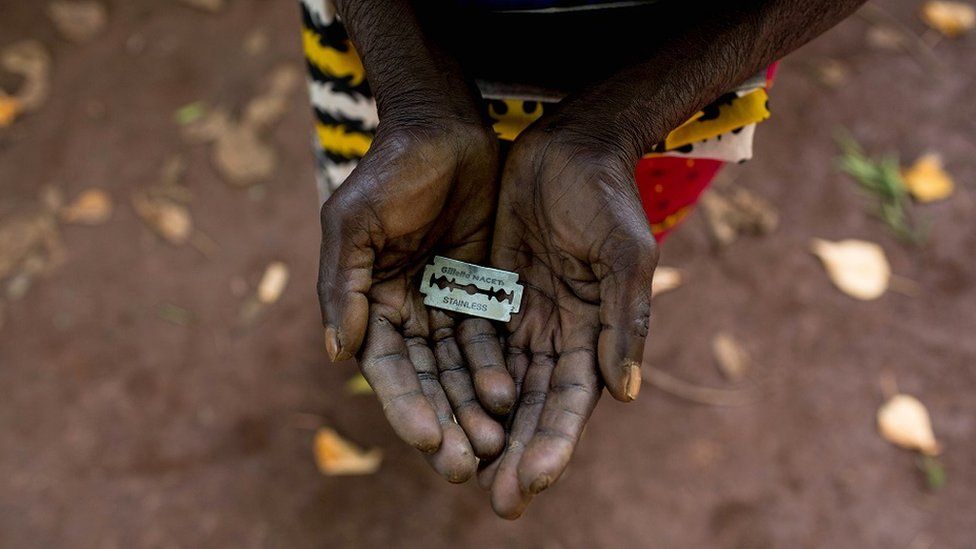Two days after the birth of her first daughter, Amaka Chukwuka’s mother proposed the idea of Female Genital Mutilation or FGM for her child. Chukwuka was stunned and confused.
Her mother insisted that their tradition dictated the baby must be circumcised after eight days.
Despite Chukwuka’s vehement opposition, she reluctantly allowed her mother to proceed.
“My mom had a traditional circumciser come over to my house to conduct the operation on my baby. She didn’t do it in the hospital for fear of being penalised by government authorities,” she explained.
Chukwuka was asked to step out of the room where the circumcision procedure was being performed on her baby.
“I couldn’t even hear my baby cry because of the distance. I was only allowed to re-enter once the procedure had been completed,” she recalled.
Chukwuka herself had undergone circumcision by her grandmother shortly after her birth, an experience that has left her with lasting mental, sexual, and psychological scars.
“While growing up, I was heedless of the fact that I was also mutilated at infancy. Even among my peers, we never engaged in discussions on circumcision, not until I gave birth to my first daughter,” she said.
A native of Oronta, Abia State, in Nigeria’s Southeast region, she is one of the estimated 200 million girls and women worldwide who have been subjected to FMG with the majority of cases occurring in Africa, the Middle East, and Asia.
Despite the widespread influence of civilisation and modernisation, certain African cultural practices and traditions continue to persist, even when they have long outlived their societal acceptance and utility.
Some of these archaic practices have been suspended, while others endure. One such uncivilised practice is Female Genital Mutilation or FGM.
Female Genital Mutilation, also known as Female Genital Cutting or Female Circumcision, is a harmful cultural practice that involves the partial or complete removal of external female genitalia or other forms of injury to female genital organs, all performed for non-medical reasons.
FGM is typically conducted on young girls, often between infancy and age 15, frequently occurring before puberty.
Nigeria, the most populous country in Africa, boasts a population of 199 million, with an annual growth rate of 3.1%, according to 2019 population estimates from the National Bureau of Statistics.
Nigeria holds the unfortunate distinction of having the highest number of FGM cases in Africa. According to the United Nations Children’s Fund (UNICEF), Nigeria ranks third globally for the highest number of women and girls aged 15-49 who have undergone FGM, estimated at approximately 19.9 million survivors. This staggering figure underscores Nigeria’s status as the country with the highest prevalence of this practice on the continent.
In Nigeria, the prevalence of FGM transcends specific religions, cultures, or ethnic groups. This practice is observed in both Christian and Muslim communities and among some indigenous and non-religious groups. It is prevalent among the Igbos, Yorubas, Hausas, and other minority tribes in Nigeria.
Now aged 51 and a mother of six grown children, Chukwuka was entirely unaware that she was expected to subject her female child to circumcision.
“The rationale behind this practice is ultimately to prevent the girl child from being sexually active before marriage,” she said. “The foreskin of her clitoris is removed with the intent that she would be apathetic towards men as she grows up.”
According to her, there were no perceptible complications after the circumcision. It is reputed that new babies do not feel much pain at eight days compared to when circumcising grown-up children. This is to eschew complications and trauma that befalls adults after mutilation. This is also consistent with male circumcision.
Regardless of the age FGM is performed, she now believes it is baseless, barbaric, inhumane, and a violation of women’s rights.
In Oronta community, the elderly women mastermind this practice. They consented and made it obligatory for every girl child to be circumcised on the eighth day, executing the act without proper knowledge.
“After my first daughter’s experience, I decided not to continue the practice on my second daughter for two reasons. Firstly, I wanted to observe the distinctness between both girls because I believe the practice is out of sheer ignorance,” she explained.
“Over time, I observed their growth and traits. There was no difference between my circumcised daughter and my uncircumcised daughter. None of them were sexually inclined or promiscuous. Therefore, I was resolute in my decision to stop circumcising my other daughters. They all behaved well, both the one I circumcised and the three I did not circumcise,” she stated.
Her second reason is religion.
“As a Christian, I raised my children in the ways of Christ. It is biblical for male children to be circumcised, but it isn’t for females. I see no reason why I should continue inflicting such unnecessary pain on my daughters,” she said.
From her standpoint, regardless of circumcision, it is spontaneous for every woman to be sexually active. What women need to inculcate in their children is self-discipline. Mothers should educate their children on how to become virtuous women, not mutilate them.
Too sour a memory
Some of the reasons given to justify Female Genital Mutilation include preventing promiscuity, the belief in perceived health benefits such as promoting fertility and ensuring the health of newborns, preserving virginity, maintaining family honour, and upholding chastity.
In contrast to Chukwuka, who underwent circumcision during infancy, Esther Agbedi is one of the women who have endured excruciating pain and long-lasting trauma after undergoing FGM.
Agbedi hails from the Amatolo community in Bayelsa State, Nigeria, and holds a First School Leaving Certificate. At the age of 19, while she was five months pregnant with her first child, she was subjected to mutilation in accordance with her tradition.
“After the circumcision, I endured excruciating pain and experienced bleeding. A herbal was applied to the bleeding site, finally stopping the next day. The area where the clitoris was removed became swollen, and I could hardly move without experiencing pain,” she recounted.
Esther explained the rationale behind the practice of FGM, stating that it aims to prevent the clitoris from touching a baby’s head, as it is believed that such contact could lead to the baby’s death. Additionally, FGM is carried out in an attempt to curb promiscuity.
However, Esther believes that the cultural perception of FGM is not justifiable, especially given the dangers of mutilation. She argues that the belief that FGM prevents promiscuity is unfounded. In fact, she points out that the removal of the clitoris, which is responsible for stimulating and providing sexual pleasure, may lead women to seek multiple sexual partners in order to satisfy their sexual needs.
Esther shares her own experience, expressing that the absence of her clitoris has made it difficult for her to reach orgasm and enjoy sexual intercourse. She acknowledges that she refrains from engaging in sexual activity to avoid being labelled as promiscuous, and she finds sex unsatisfying due to her inability to climax.
She also highlights the social consequences women in her community face who are not circumcised, including stigmatisation and limitations on participating in traditional rites. She has chosen not to circumcise her female children but respects their right to make their own decisions regarding FGM.
Esther’s friend from another community, who is not circumcised and has three children, proves that FGM is unnecessary for a woman’s well-being.
Despite existing legislation against FGM, Esther notes that it is still practised in her community. She supports the law as a means to protect the lives of females and deter practitioners through jail sentences.
Mrs Ajiri Favour, a Senior Nurse Superintendent, condemns FGM, emphasising its violation of female privacy and human dignity. She notes that FGM may lead to promiscuity and sexual dissatisfaction due to removing the clitoris.
Also, Mrs Chinyere Nwaigbo, Chief Nursing Officer, warns of the greater risk of haemorrhage during childbirth as a result of obstructed labour and scar tissue from FGM. She also highlights the risk of infection due to unsterilised instruments used during childbirth, increasing the chances of maternal mortality.
Amaka Chukwuka recounts her experience with Female Genital Mutilation (FGM) when her mother insisted on circumcising her newborn daughter, citing tradition. Female Genital Mutilation, a harmful practice involving the removal or injury of female genitalia, is prevalent in Nigeria, particularly among the Igbos, Yorubas, Hausas, and other tribes, affecting women of various religions and backgrounds. Chukwuka, who also underwent FGM, regrets allowing it for her first daughter and chose not to do it for her subsequent daughters, observing no differences in behavior or promiscuity between her circumcised and uncircumcised children. The narrative highlights the severe physical and psychological consequences of FGM, exemplified by another survivor, Esther Agbedi, who faced significant trauma and sexual dysfunction post-mutilation. Despite laws against FGM, the practice continues due to cultural beliefs. Health professionals and advocates condemn FGM for its violation of human rights and potential to cause severe health complications.






